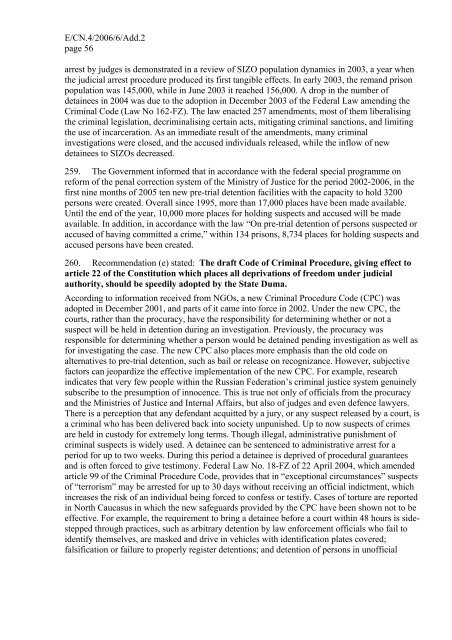E Economic and Social Council - acnudh
E Economic and Social Council - acnudh
E Economic and Social Council - acnudh
Create successful ePaper yourself
Turn your PDF publications into a flip-book with our unique Google optimized e-Paper software.
E/CN.4/2006/6/Add.2<br />
page 56<br />
arrest by judges is demonstrated in a review of SIZO population dynamics in 2003, a year when<br />
the judicial arrest procedure produced its first tangible effects. In early 2003, the rem<strong>and</strong> prison<br />
population was 145,000, while in June 2003 it reached 156,000. A drop in the number of<br />
detainees in 2004 was due to the adoption in December 2003 of the Federal Law amending the<br />
Criminal Code (Law No 162-FZ). The law enacted 257 amendments, most of them liberalising<br />
the criminal legislation, decriminalising certain acts, mitigating criminal sanctions, <strong>and</strong> limiting<br />
the use of incarceration. As an immediate result of the amendments, many criminal<br />
investigations were closed, <strong>and</strong> the accused individuals released, while the inflow of new<br />
detainees to SIZOs decreased.<br />
259. The Government informed that in accordance with the federal special programme on<br />
reform of the penal correction system of the Ministry of Justice for the period 2002-2006, in the<br />
first nine months of 2005 ten new pre-trial detention facilities with the capacity to hold 3200<br />
persons were created. Overall since 1995, more than 17,000 places have been made available.<br />
Until the end of the year, 10,000 more places for holding suspects <strong>and</strong> accused will be made<br />
available. In addition, in accordance with the law “On pre-trial detention of persons suspected or<br />
accused of having committed a crime,” within 134 prisons, 8,734 places for holding suspects <strong>and</strong><br />
accused persons have been created.<br />
260. Recommendation (e) stated: The draft Code of Criminal Procedure, giving effect to<br />
article 22 of the Constitution which places all deprivations of freedom under judicial<br />
authority, should be speedily adopted by the State Duma.<br />
According to information received from NGOs, a new Criminal Procedure Code (CPC) was<br />
adopted in December 2001, <strong>and</strong> parts of it came into force in 2002. Under the new CPC, the<br />
courts, rather than the procuracy, have the responsibility for determining whether or not a<br />
suspect will be held in detention during an investigation. Previously, the procuracy was<br />
responsible for determining whether a person would be detained pending investigation as well as<br />
for investigating the case. The new CPC also places more emphasis than the old code on<br />
alternatives to pre-trial detention, such as bail or release on recognizance. However, subjective<br />
factors can jeopardize the effective implementation of the new CPC. For example, research<br />
indicates that very few people within the Russian Federation’s criminal justice system genuinely<br />
subscribe to the presumption of innocence. This is true not only of officials from the procuracy<br />
<strong>and</strong> the Ministries of Justice <strong>and</strong> Internal Affairs, but also of judges <strong>and</strong> even defence lawyers.<br />
There is a perception that any defendant acquitted by a jury, or any suspect released by a court, is<br />
a criminal who has been delivered back into society unpunished. Up to now suspects of crimes<br />
are held in custody for extremely long terms. Though illegal, administrative punishment of<br />
criminal suspects is widely used. A detainee can be sentenced to administrative arrest for a<br />
period for up to two weeks. During this period a detainee is deprived of procedural guarantees<br />
<strong>and</strong> is often forced to give testimony. Federal Law No. 18-FZ of 22 April 2004, which amended<br />
article 99 of the Criminal Procedure Code, provides that in “exceptional circumstances” suspects<br />
of “terrorism” may be arrested for up to 30 days without receiving an official indictment, which<br />
increases the risk of an individual being forced to confess or testify. Cases of torture are reported<br />
in North Caucasus in which the new safeguards provided by the CPC have been shown not to be<br />
effective. For example, the requirement to bring a detainee before a court within 48 hours is sidestepped<br />
through practices, such as arbitrary detention by law enforcement officials who fail to<br />
identify themselves, are masked <strong>and</strong> drive in vehicles with identification plates covered;<br />
falsification or failure to properly register detentions; <strong>and</strong> detention of persons in unofficial
















